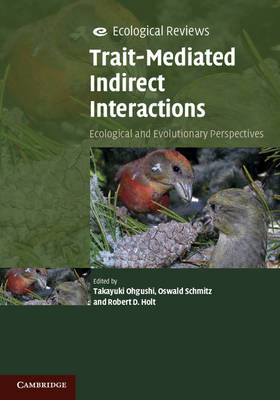
Trait-Mediated Indirect Interactions
Cambridge University Press (Verlag)
978-1-107-00183-1 (ISBN)
There is increasing evidence that the structure and functioning of ecological communities and ecosystems are strongly influenced by flexible traits of individuals within species. A deep understanding of how trait flexibility alters direct and indirect species interactions is crucial for addressing key issues in basic and applied ecology. This book provides an integrated perspective on the ecological and evolutionary consequences of interactions mediated by flexible species traits across a wide range of systems. It is the first volume synthesizing the rapidly expanding research field of trait-mediated indirect effects and highlights how the conceptual framework of these effects can aid the understanding of evolutionary processes, population dynamics, community structure and stability, and ecosystem function. It not only brings out the importance of this emerging field for basic ecological questions, but also explores the implications of trait-mediated interactions for the conservation of biodiversity and the response of ecosystems to anthropogenic environmental changes.
Takayuki Ohgushi is a Professor at the Center for Ecological Research at Kyoto University. His research focus is on population biology of insect herbivores, plant-herbivore interactions, multi-trophic interactions and the linkage from gene to ecosystem. In particular, he is interested in how trait-mediated indirect effects create ecological communities and biodiversity. Oswald Schmitz is the Oastler Professor of Population and Community Ecology, in the Yale University School of Forestry and Environmental Studies. He studies the linkage between two important components of natural systems: biodiversity and ecosystem services, using field experimentation guided by formal mathematical theory of trait-based species interactions. Robert D. Holt is Arthur R. Marshall, Jr Chair in Ecology and Eminent Scholar, in the Department of Biology at the University of Florida. He is an evolutionary and community ecologist whose contributions are principally theoretical, but always tied to concrete processes in the natural world. He has received the International Ecology Institute Prize in Terrestrial Ecology and the Sewall Wright Award from the American Society of Naturalists.
List of contributors; Foreword; Preface; 1. Introduction; Part I. Community: 2. Perspective: kinds of trait-mediated indirect effects in ecological communities: a synthesis; 3. Consequences of trait changes in host-parasitoid interactions in insect communities; 4. The impact of trait-mediated indirect interactions in marine communities; 5. Trait-mediated indirect interactions in size-structured populations: causes and consequences for species interactions and community dynamics; 6. Trait-mediated effects, density dependence, and the dynamic stability of ecological systems; 7. Plant effects on herbivore-enemy interactions in natural systems; 8. The implications of adaptive prey behavior for ecological communities: a review of current theory; 9. Community consequences of phenotypic plasticity of terrestrial plants: herbivore-initiated bottom-up trophic cascades; 10. Model-based, response surface approaches to quantifying indirect interactions; Part II. Coevolution: 11. Perspective: trait-mediated indirect interactions and the coevolutionary process; 12. Evolutionary indirect effects: examples from introduced plant and herbivore interactions; 13. Indirect evolutionary interactions in a multi-trophic system; 14. The role of trait-mediated indirect interactions for multispecies plant-animal mutualisms; 15. Consequences of trait evolution in a multi-species system; Part III. Ecosystem: 16. Perspective: interspecific indirect genetic effects (IIGEs): linking genetics and genomics to community ecology and ecosystem processes; 17. Species functional traits, trophic control, and the ecosystem consequences of adaptive foraging in the middle of food chains; 18. Effects of herbivores on terrestrial ecosystem processes: the role of trait mediated indirect effects; 19. Functional and heritable consequences of plant genotype on community composition and ecosystem processes; 20. Microbial mutualists and biodiversity in ecosystems; 21. Integrating trait-mediated effects and non-trophic interactions in the study of biodiversity and ecosystem functioning; Part IV. Applied Ecology: 22. Perspective: consequences of trait-mediated indirect interactions for biological control of plant pests; 23. Natural enemy functional identity, trait-mediated interactions, and biological control; 24. Trait-mediated effects modify patch-size density relationships in insect herbivores and parasitoids; 25. Plasticity and trait-mediated indirect interactions among plants; 26. Climate change, phenology, and the nature of consumer-resource interactions: advancing the match/mismatch hypothesis; 27. Coda; Index.
| Erscheint lt. Verlag | 6.12.2012 |
|---|---|
| Reihe/Serie | Ecological Reviews |
| Zusatzinfo | 14 Plates, color; 12 Halftones, unspecified; 63 Line drawings, unspecified |
| Verlagsort | Cambridge |
| Sprache | englisch |
| Maße | 180 x 252 mm |
| Gewicht | 1260 g |
| Themenwelt | Naturwissenschaften ► Biologie ► Botanik |
| Naturwissenschaften ► Biologie ► Evolution | |
| Naturwissenschaften ► Biologie ► Ökologie / Naturschutz | |
| ISBN-10 | 1-107-00183-8 / 1107001838 |
| ISBN-13 | 978-1-107-00183-1 / 9781107001831 |
| Zustand | Neuware |
| Haben Sie eine Frage zum Produkt? |
aus dem Bereich


